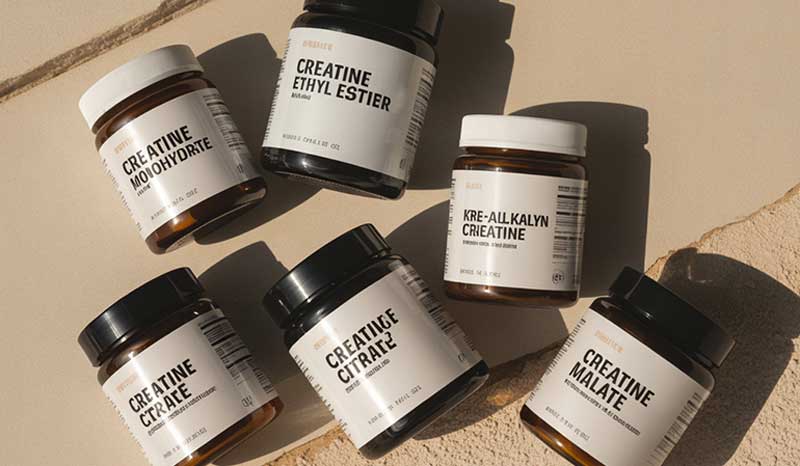Which Creatine Is Best for Bulking? Full Guide
When it comes to building muscle mass and strength, creatine supplementation is often at the forefront of discussions.
Among the various forms available, choosing the right type of creatine can significantly impact your bulking journey.
This guide delves into the best creatine options for bulking, tailored specifically for fitness enthusiasts in India.
Creatine and Its Role in Bulking
Creatine is a naturally occurring compound found in small amounts in certain foods and synthesized by the body from amino acids.
It's stored in muscles and used for energy during high-intensity activities.
Supplementing with creatine increases the phosphocreatine stores in muscles, allowing for more ATP production, which is the primary energy carrier in cells.
This enhancement leads to improved performance, increased strength, and muscle growth.
How Creatine Supports Bulking
-
Increased Strength: Creatine supplementation has been shown to improve strength and power output during high-intensity training sessions.
-
Enhanced Muscle Mass: By increasing water retention in muscle cells, creatine contributes to muscle volumization, leading to an increase in muscle mass.
-
Improved Recovery: Creatine may help reduce muscle damage and inflammation, aiding in faster recovery between workouts.
-
Elevated Performance: With more available energy, you can perform more repetitions or lift heavier weights, stimulating greater muscle growth.
Creatine Monohydrate: The Gold Standard for Bulking
Creatine monohydrate is best for bulking, proven to boost strength, increase muscle mass, and support high-intensity workouts effectively.
Creatine monohydrate is the most researched and widely used form of creatine. It's known for its effectiveness in increasing muscle mass and strength.
✅ Benefits of Creatine Monohydrate
-
Proven Efficacy: Numerous studies have demonstrated its ability to enhance strength, power, and muscle mass.
-
Cost-Effective: It's one of the most affordable creatine supplements available.
-
Safety Profile: Creatine monohydrate has a well-established safety profile when used correctly.
Considerations
-
Water Retention: Some users may experience water retention, leading to temporary weight gain.
-
Digestive Issues: A small percentage of individuals might experience stomach discomfort or bloating.
Despite these minor drawbacks, creatine monohydrate remains the gold standard due to its extensive research backing and proven benefits.

Creatine Hydrochloride (HCl): A Soluble Alternative
Creatine HCl is a newer form of creatine that has gained popularity due to its enhanced solubility in water.
This increased solubility may reduce the likelihood of digestive discomfort.
✅ Benefits of Creatine HCl
-
Better Solubility: Easier to mix and potentially gentler on the stomach.
-
Lower Dosage: Some manufacturers claim that a smaller dose is needed for effectiveness.
Considerations
-
Limited Research: While promising, there is limited research comparing creatine HCl to creatine monohydrate in terms of performance benefits.
-
Higher Cost: Creatine HCl is often more expensive than creatine monohydrate without conclusive evidence of superior benefits.
Creatine Ethyl Ester: The Absorption Claim
Creatine ethyl ester is a form of creatine that has been esterified to improve its absorption rate.
Some proponents claim it requires a smaller dose and is better absorbed by the body.
✅ Benefits of Creatine Ethyl Ester
-
Potential for Better Absorption: The esterification process may enhance creatine uptake into muscles.
Considerations
-
Mixed Research Results: Studies have shown mixed results regarding its effectiveness compared to creatine monohydrate.
-
Taste and Stability Issues: Creatine ethyl ester may have a bitter taste and lower stability, potentially affecting its shelf life.
Buffered Creatine: pH-Corrected for Stability
Buffered creatine, often marketed as Kre-Alkalyn, is creatine monohydrate that has been processed to have a higher pH level.
The theory is that this buffering process prevents the breakdown of creatine into creatinine, a waste product, before it reaches the muscles.
✅ Benefits of Buffered Creatine
-
Stability: Higher pH may reduce the conversion of creatine to creatinine.
-
Reduced Side Effects: Some users report fewer digestive issues.
Considerations
-
Lack of Strong Evidence: Research comparing buffered creatine to standard creatine monohydrate is limited.
-
Increased Cost: Buffered creatine is typically more expensive without substantial evidence of superior benefits.
Creatine Citrate and Creatine Malate: Specialized Forms
Creatine citrate and creatine malate are forms of creatine bound with citric acid and malic acid, respectively.
These forms are often marketed for their improved solubility and potential benefits for endurance athletes.
✅ Benefits of Creatine Citrate and Malate
-
Enhanced Solubility: Better mixing in water, potentially reducing stomach discomfort.
-
Additional Benefits: The acids may provide additional energy production benefits.
Considerations
-
Lower Creatine Content: These forms contain less creatine per dose compared to monohydrate.
-
Higher Cost: Due to additional processing, they are often more expensive.

Choosing the Right Creatine for Bulking
When selecting a creatine supplement for bulking, consider your specific fitness goals, budget, and any potential sensitivities.
-
For General Strength and Muscle Growth: Creatine monohydrate is the most effective and cost-efficient choice.
-
For Those with Digestive Sensitivities: Creatine HCl may be a gentler option.
-
For Endurance Athletes: Creatine citrate or malate might offer additional benefits due to their solubility and energy production properties.
Always consult with a healthcare professional before starting any new supplement regimen, especially if you have underlying health conditions or are taking medications.
Conclusion
Creatine is a powerful supplement that can enhance performance, strength, and muscle growth.
While various forms are available, creatine monohydrate remains the most researched and effective option for most individuals.
By understanding the different types of creatine and aligning them with your fitness goals, you can make an informed decision that supports your health and performance objectives.
